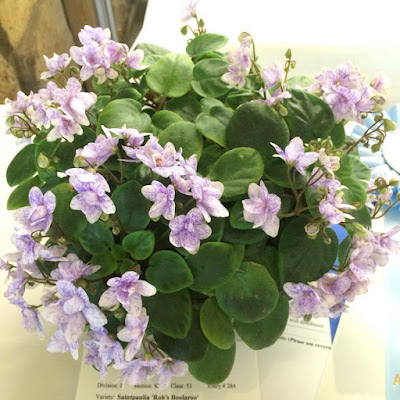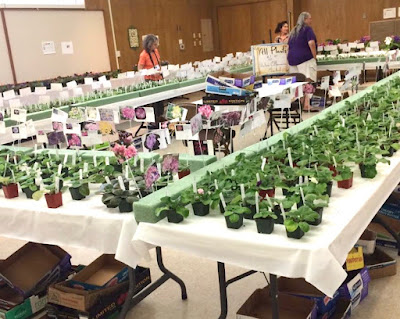
Capital City club hosts huge houseplant event Saturday

|
|
This beauty is identified as a Rob's Boolaroo variety of
African violet, a winner at a previous Capital City show.
(Photos: Debbie Arrington)
|
It’s violet time (again) in Sacramento. On Saturday, April 2, the Capital City African Violet Society will host its annual spring sale at Shepard Garden and Arts Center in McKinley Park.
Instead of a judged show, the club will host a display of members’ prized African violets at their peak of bloom. That way patrons can see some of the beautiful varieties also offered in the sale.
The club’s major fundraiser, the sale features hundreds of plants, ready to go to new homes. Many of these are unusual varieties that aren't available in local nurseries.
In addition, the club offers supplies for growing African violets and other flowering houseplants. Also, get advice on repotting African violets and prompting them to bloom.
Sale hours will be 10 a.m. to 4 p.m. Saturday or when all plants are sold. Admission and parking are free.
Shepard Center is located at 3330 McKinley Blvd., Sacramento.

|
|
The Shepard Center will be filled with African violets again on
April 2.
|
Comments
0 comments have been posted.Sacramento Digs Gardening to your inbox.
Food in My Back Yard Series
May 6: Maintain soil moisture with mulch for garden success
April 29: What's (already) wrong with my tomato plants?
April 22: Should you stock up on fertilizer? (Yes!)
April 15: Grow culinary herbs in containers
April 8: When to plant summer vegetables
April 1: Don't be fooled by these garden myths
March 25: Fertilizer tips: How to 'feed' your vegetables for healthy growth
March 18: Time to give vegetable seedlings some more space
March 11: Ways to win the fight against weeds
March 4: Potatoes from the garden
Feb. 25: Plant a fruit tree now -- for later
Feb. 18: How to squeeze more food into less space
Feb. 11: When to plant? Consider staggering your transplants
Feb. 4: Starting in seed starting
Sites We Like
Garden Checklist for week of May 11
Make the most of the lower temperatures early in the week. We’ll be back in the 80s by Thursday.
* Plant, plant, plant! It’s prime planting season in the Sacramento area. Time to set out those tomato transplants along with peppers and eggplants. Pinch off any flowers on new transplants to make them concentrate on establishing roots instead of setting premature fruit.
* Direct-seed melons, cucumbers, summer squash, corn, radishes, pumpkins and annual herbs such as basil.
* Harvest cabbage, lettuce, peas and green onions.
* In the flower garden, direct-seed sunflowers, cosmos, salvia, zinnias, marigolds, celosia and asters. (You also can transplant seedlings for many of the same flowers.)
* Plant dahlia tubers.
* Transplant petunias, marigolds and perennial flowers such as astilbe, columbine, coneflowers, coreopsis, dahlias, rudbeckia and verbena.
* Keep an eye out for slugs, snails, earwigs and aphids that want to dine on tender new growth.
* Feed summer bloomers with a balanced fertilizer.
* For continued bloom, cut off spent flowers on roses as well as other flowering plants.
* Add mulch to the garden to maintain moisture. Mulch also cuts down on weeds. But don’t let it mound around the stems or trunks of trees or shrubs. Leave about a 6-inch-to-1-foot circle to avoid crown rot or other problems.
* Remember to weed! Pull those nasties before they set seed.
* Water early in the day and keep seedlings evenly moist.